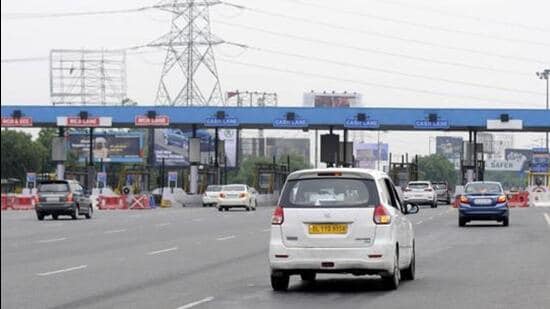Our Terms & Conditions | Our Privacy Policy
MCD asks Delhi govt for ₹900 crore a year to offset toll removal revenue loss | Latest News Delhi
The Municipal Corporation of Delhi (MCD) has written to the Delhi government, suggesting that it provide a financial assistance of ₹900 crore annually if toll tax collection at the Capital’s border points is to be stopped in order to ease congestion, senior civic officials said.
Traffic jams are frequently reported at toll plazas, especially along Ghazipur, Rajokri, Badarpur, and Kalindi Kunj. Of the 156 toll plazas in Delhi, more than 85% of traffic enters the city through just 13 points. (HT Archive)
The corporation has proposed two alternatives to offset the potential revenue loss: either an annual payment of ₹900 crore from the government, with a 3–4% inflation-linked increase every year, or a 1% hike in transfer duty on the sale and purchase of immovable property in Delhi.
The proposal comes in the wake of Union road transport and highways minister Nitin Gadkari’s appeal in June to remove MCD-operated toll booths at the city’s borders, which he said cause traffic snarls, delays, and wasted man-hours.
“The revenue from toll tax is a major source of income for the MCD. If toll booths are removed, the Delhi government should compensate us either through an annual grant or an increase in transfer duty,” a senior MCD official said. “A letter has already been sent by the additional commissioner to the urban development department of the Delhi government in this regard.”
The letter also referred to the June meeting where Gadkari underlined the need to eliminate toll booths.
Officials stressed that toll tax is being charged under existing norms, while Environment Compensation Charge (ECC) is levied on commercial vehicles as per Supreme Court directions. “We have not received any response from the Delhi government yet,” the official added.
Under Section 113(2) of the Delhi Municipal Corporation Act, 1957, toll is collected from commercial vehicles entering Delhi. The system has been in place since 2000. ECC, imposed in 2015 on the Supreme Court’s directions, is an additional fee meant to discourage polluting vehicles, reduce air pollution, and generate funds for improving public transport and pedestrian infrastructure.
Traffic jams are frequently reported at toll plazas, especially along Ghazipur, Rajokri, Badarpur, and Kalindi Kunj. Of the 156 toll plazas in Delhi, more than 85% of traffic enters the city through just 13 points.
In 2019, RFID-based toll payment was made mandatory. However, officials said ECC still requires cargo vehicles to stop for checking. “The rates differ for empty vehicles and those carrying essential goods, so physical verification is necessary. A petition has been filed in the Supreme Court to review the ECC system for greater uniformity,” an MCD official explained.
Images are for reference only.Images and contents gathered automatic from google or 3rd party sources.All rights on the images and contents are with their legal original owners.



Comments are closed.